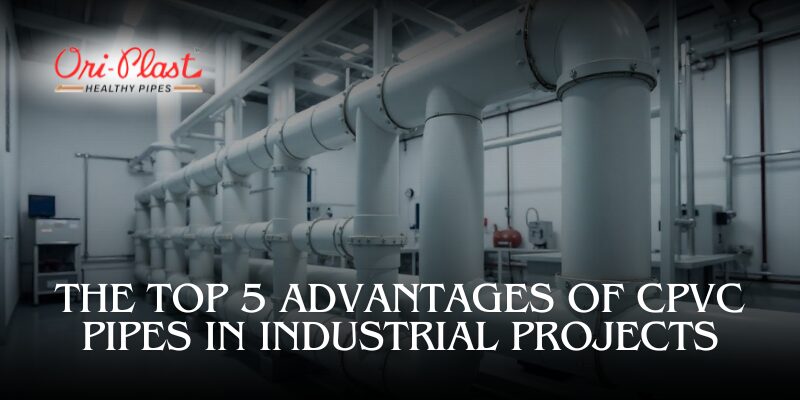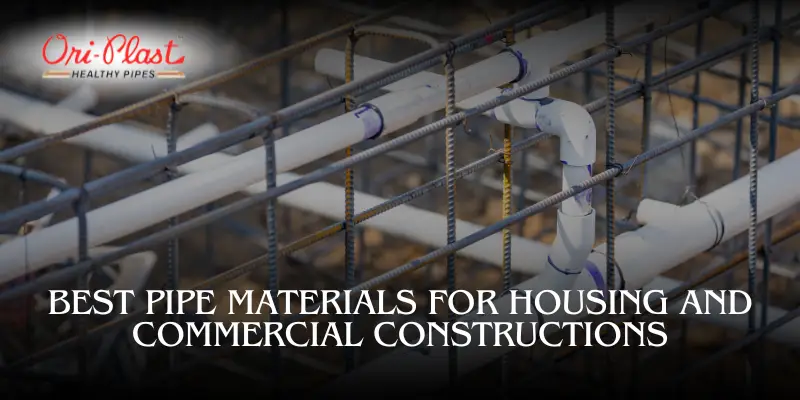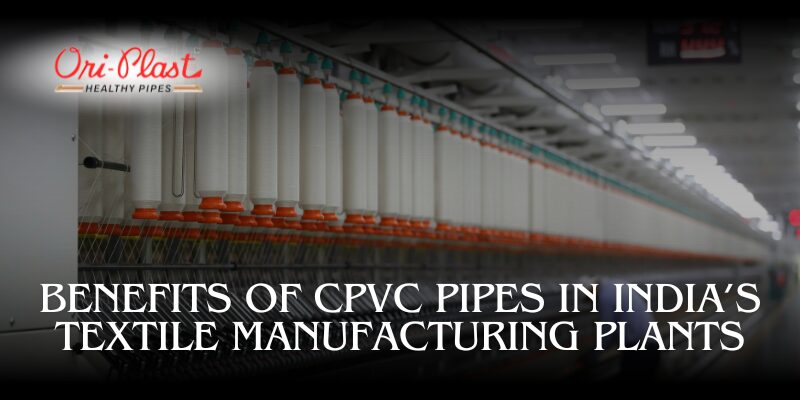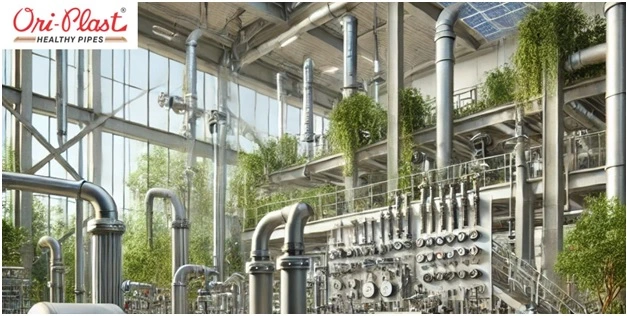Corrosion Resistance
Industrial environments are often harsh, with pipes exposed to chemicals, moisture, and extreme conditions that can cause traditional materials like steel to corrode. Corrosion not only weakens the infrastructure but also leads to frequent leaks, contamination, and system failures.CPVC’s Edge
CPVC pipes offer exceptional resistance to corrosion, making them ideal for transporting a wide range of fluids, including water, acids, alkalis, and other chemicals. Unlike metal pipes, CPVC does not react with these substances, ensuring long-term durability.Benefits of Corrosion Resistance
- Extended System Lifespan: CPVC pipes can last over 50 years in industrial settings with minimal wear and tear.
- Reduced Maintenance Costs: By preventing corrosion, businesses save significantly on repair and replacement expenses.
- Minimized Leaks and Failures: A corrosion-resistant system ensures operational reliability, reducing downtime and disruptions.
- Improved Product Quality: With no risk of contamination, industries like food processing and pharmaceuticals can maintain high standards.
High-Temperature Tolerance
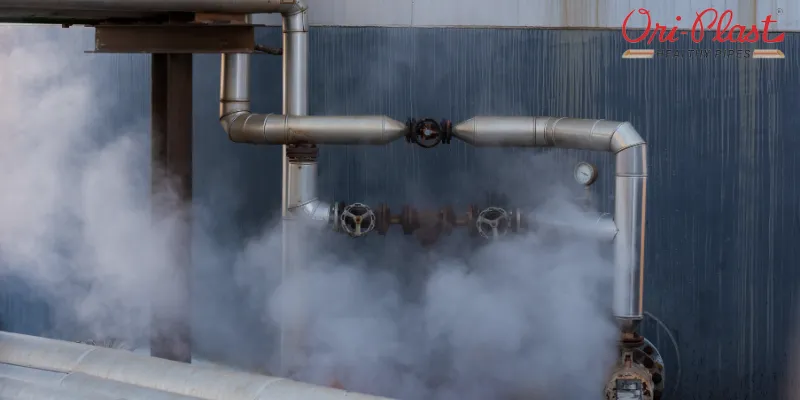 Industrial applications often involve the transportation of high-temperature fluids like steam, hot water, and chemicals. Many traditional piping materials degrade under such conditions, leading to frequent replacements.
Industrial applications often involve the transportation of high-temperature fluids like steam, hot water, and chemicals. Many traditional piping materials degrade under such conditions, leading to frequent replacements. CPVC’s Edge
CPVC pipes are engineered to withstand temperatures up to 93°C (200°F) without compromising their structural integrity. This makes them suitable for a wide range of high-temperature applications.Benefits of High-Temperature Tolerance
- Enhanced Process Efficiency: CPVC pipes maintain their performance even under extreme temperatures, ensuring smooth operations.
- Reduced Energy Consumption: Their low thermal conductivity minimizes heat loss, improving energy efficiency.
- Lower Operating Costs: With reduced wear and tear, CPVC pipes require fewer replacements and repairs.
Chemical Resistance
Industries such as pharmaceuticals, petrochemicals, and food processing often handle aggressive chemicals that can degrade traditional piping materials. Ensuring the safe and efficient transport of these substances is critical.CPVC’s Edge
CPVC pipes exhibit outstanding resistance to a broad spectrum of chemicals, including strong acids, solvents, and cleaning agents. They maintain their integrity even in highly aggressive environments.Benefits of Chemical Resistance
- Reduced Risk of Contamination: CPVC pipes do not leach chemicals into the transported fluids, ensuring product purity.
- Increased Worker Safety: Chemical-resistant pipes minimize the risk of leaks and spills, protecting workers from exposure.
- Environmental Safety: With fewer leaks and spills, CPVC contributes to cleaner and safer surroundings.
Easy Installation and Maintenance
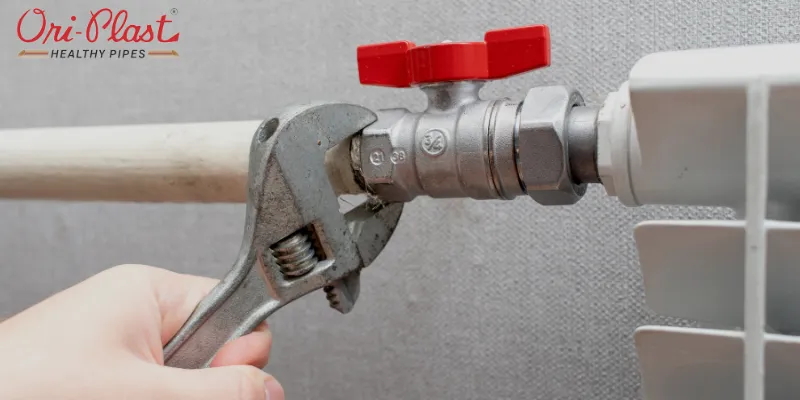 Time and labor costs are significant concerns during the installation and maintenance of industrial piping systems. Complex installations and frequent maintenance can disrupt operations and inflate expenses.
Time and labor costs are significant concerns during the installation and maintenance of industrial piping systems. Complex installations and frequent maintenance can disrupt operations and inflate expenses. CPVC’s Edge
CPVC pipes are lightweight and flexible, making them easy to transport, handle, and install. The solvent cement joining method ensures quick, reliable, and leak-proof connections.Benefits of Easy Installation and Maintenance
- Faster Installations: CPVC pipes’ simple joining techniques reduce installation time by up to 50% compared to traditional methods.
- Minimal Maintenance: Their durability and resistance to wear significantly lower maintenance needs.
- Reduced Downtime: With fewer repairs required, industries can maintain continuous operations.
Cost-Effectiveness
While the initial cost of CPVC pipes might be slightly higher than some alternatives, their long-term benefits far outweigh the investment.CPVC’s Edge
The combination of durability, low maintenance, and energy efficiency makes CPVC pipes a cost-effective solution for industrial projects.Benefits of Cost-Effectiveness
- Increased Durability: With a lifespan of 50+ years, CPVC pipes reduce the need for frequent replacements.
- Lower Repair Costs: Their resistance to corrosion and chemicals minimizes repair expenses.
- Energy Efficiency: Reduced heat loss in high-temperature applications leads to energy savings.
- Minimized Disruptions: Reliable performance ensures smooth operations, avoiding costly downtimes.
Conclusion
Reliable and efficient piping systems are essential for the success of industrial projects, and CPVC pipes have proven to be a game-changer. From corrosion resistance to high-temperature tolerance, chemical resistance, easy installation, and cost-effectiveness, CPVC pipes offer unmatched advantages that address the diverse needs of industries. By investing in CPVC systems, businesses can achieve longer system lifespans, lower maintenance costs, and improved safety and efficiency. Whether it’s a chemical plant, a textile mill, or a commercial building, CPVC pipes deliver value, reliability, and peace of mind. If you’re considering upgrading your industrial piping systems, CPVC pipes are the way to go. Make the switch today and experience the difference!FAQ
What are the primary Advantages of CPVC Pipes in industrial projects?
CPVC pipes are corrosion-resistant, durable, and handle high temperatures, making them ideal for industrial applications requiring long-term performance and reliability.Why are CPVC pipes better than traditional metal pipes?
Unlike metal pipes, CPVC pipes resist corrosion, scale buildup, and chemical damage, ensuring longer service life and consistent performance in industrial environments.How do CPVC pipes handle extreme temperatures in industrial processes?
CPVC pipes maintain their strength and efficiency under high temperatures, making them suitable for handling hot water, steam, and other thermal processes.Can CPVC pipes reduce maintenance costs in industrial plants?
Yes, CPVC pipes require minimal maintenance due to their resistance to corrosion and scaling, significantly reducing repair costs over time.Are CPVC pipes environmentally friendly for industrial use?
Yes, CPVC pipes are eco-friendly, with low energy requirements for manufacturing and non-toxic materials that ensure safe disposal after use.How do CPVC pipes improve safety in industrial facilities?
CPVC pipes are fire-resistant and emit minimal toxic fumes in case of fire, ensuring worker and facility safety in hazardous conditions.Do CPVC pipes support chemical-intensive industrial processes?
Yes, CPVC pipes offer excellent chemical resistance, ensuring durability and preventing leaks or degradation when exposed to aggressive industrial chemicals.What industries benefit the most from CPVC pipes?
Industries like textiles, chemicals, food processing, and manufacturing benefit from CPVC pipes due to their adaptability and performance in diverse applications.Are CPVC pipes easy to install in industrial projects?
Yes, CPVC pipes are lightweight and easy to install, reducing labor costs and project timelines compared to heavier, complex piping systems.How do CPVC pipes enhance operational efficiency in industrial settings?
Their durability, reliability, and resistance to wear ensure uninterrupted operations, boosting productivity and reducing downtime in industrial plants.

